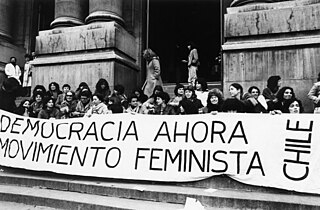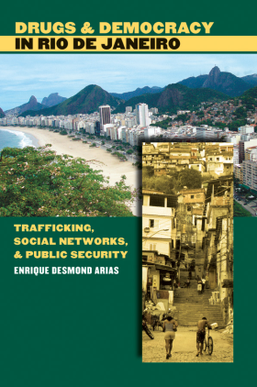Related Research Articles

A dictatorship is an autocratic form of government which is characterized by a leader, or a group of leaders, who hold governmental powers with few to no limitations. Politics in a dictatorship are controlled by a dictator, and they are facilitated through an inner circle of elites that includes advisers, generals, and other high-ranking officials. The dictator maintains control by influencing and appeasing the inner circle and repressing any opposition, which may include rival political parties, armed resistance, or disloyal members of the dictator's inner circle. Dictatorships can be formed by a military coup that overthrows the previous government through force or they can be formed by a self-coup in which elected leaders make their rule permanent. Dictatorships are authoritarian or totalitarian, and they can be classified as military dictatorships, one-party dictatorships, personalist dictatorships, or absolute monarchies.

A riot or mob violence is a form of civil disorder commonly characterized by a group lashing out in a violent public disturbance against authority, property, or people.

Beginning in May 1968, a period of civil unrest occurred throughout France, lasting seven weeks and punctuated by demonstrations, general strikes, and the occupation of universities and factories. At the height of events, which have since become known as May 68, the economy of France came to a halt. The protests reached a point that made political leaders fear civil war or revolution; the national government briefly ceased to function after President Charles de Gaulle secretly fled France to West Germany on the 29th. The protests are sometimes linked to similar movements around the same time worldwide that inspired a generation of protest art in the form of songs, imaginative graffiti, posters, and slogans.

An authoritarian military dictatorship ruled Chile for seventeen years, between 11 September 1973 and 11 March 1990. The dictatorship was established after the democratically elected socialist government of Salvador Allende was overthrown in a coup d'état backed by the United States on 11 September 1973. During this time, the country was ruled by a military junta headed by General Augusto Pinochet. The military used the breakdown of democracy and the economic crisis that took place during Allende's presidency to justify its seizure of power. The dictatorship presented its mission as a "national reconstruction". The coup was the result of multiple forces, including pressure from conservative groups, certain political parties, union strikes and other domestic unrest, as well as international factors.

The 1992 Los Angeles riots, were a series of riots and civil disturbances that occurred in Los Angeles County, California, United States, during April and May 1992. Unrest began in South Central Los Angeles on April 29, after a jury acquitted four officers of the Los Angeles Police Department (LAPD) charged with using excessive force in the arrest and beating of Rodney King. The incident had been videotaped by George Holliday, who was a bystander to the incident, and was heavily broadcast in various news and media outlets.
The First Quarter Storm, often shortened into the acronym FQS, was a period of civil unrest in the Philippines which took place during the "first quarter of the year 1970". It included a series of demonstrations, protests, and marches against the administration of President Ferdinand Marcos, mostly organized by students and supported by workers, peasants, and members of the urban poor, from January 26 to March 17, 1970. Protesters at these events raised issues related to social problems, authoritarianism, alleged election fraud, and corruption at the hand of Marcos.

A three-week period of riots took place in the suburbs of Paris and other French cities in October and November 2005. These riots involved youth in violent attacks, and the burning of cars and public buildings.

Charles Tilly was an American sociologist, political scientist, and historian who wrote on the relationship between politics and society. He was a professor of history, sociology, and social science at the University of Michigan from 1969 to 1984 before becoming the Joseph L. Buttenwieser Professor of Social Science at Columbia University.

The protests of 1968 comprised a worldwide escalation of social conflicts, which were predominantly characterized by the rise of left-wing politics, anti-war sentiment, civil rights urgency, youth counterculture within the silent and baby boomer generations, and popular rebellions against state militaries and bureaucracies.
Riots often occur in reaction to a perceived grievance or out of dissent. Riots may be the outcome of a sporting event, although many riots have occurred due to poor working or living conditions, government oppression, conflicts between races or religions.

On 11 March 1990, Chile transitioned to a democracy, ending the military regime led by General Augusto Pinochet. This transition lasted 15 years. Unlike most democratic transitions led by either the elite or the people, this democratic transition process is known as an intermediate transition – a transition involving both the regime and the civil society. Throughout the transition, as the regime increased repressive violence, it simultaneously supported liberalization – progressively strengthening democratic institutions and gradually weakening that of the military.
Janet Lippman Abu-Lughod was an American sociologist who made major contributions to world-systems theory and urban sociology.

Political violence is violence which is perpetrated in order to achieve political goals. It can include violence which is used by a state against other states (war), violence which is used by a state against civilians and non-state actors, and violence which is used by violent non-state actors against states and civilians. It can also describe politically motivated violence which is used by violent non-state actors against a state or it can describe violence which is used against other non-state actors and/or civilians. Non-action on the part of a government can also be characterized as a form of political violence, such as refusing to alleviate famine or otherwise denying resources to politically identifiable groups within their territory.

An arpillera, which means burlap in Spanish, is a brightly colored patchwork picture made predominantly by groups of women. The construction of arpilleras became popular in Chile during the military dictatorship (1973–90) of Augusto Pinochet. Arpilleras were made in workshops organized by a committee of the Chilean Catholic Church and then secretly distributed abroad through the church's human rights group, the Vicariate of Solidarity. The production of arpilleras provided a vital source of income for the arpilleristas, many of whom had been left in a state of financial insecurity due to widespread unemployment and forced disappearances of their husbands and children, who became known as desaparecidos.

Feminism in Chile has its own liberation language and activist strategies for rights that is shaped by the political, economic, and social system of Chile. Beginning in the 19th century, Chilean women have been organizing with aspirations of asserting their political rights. These aspirations have had to work against the reality that Chile is one of the most socially conservative countries in Latin America. The Círculo de Estudios de la Mujer is one example of a pioneering women's organization during the Pinochet dictatorship (1973–1989) which redefined women's responsibilities and rights, linking “mothers’ rights” to women's rights and women's civil liberties. The founding members of the Círculo de Estudios de La Mujer consisted of a small group of Santiago feminists who were from the Academia de Humanismo Cristiano. These women gathered "to discuss the situation of women in Chile," their first meeting drew a crowd of over 300 participants and from there challenged the authoritarian life in Santiago. These women helped shape the rights for women in Chile.

Drugs and Democracy in Rio de Janeiro: Trafficking, Social Networks, and Public Security is a book by Enrique Desmond Arias published by the University of North Carolina Press in 2006. This book takes an interdisciplinary approach to understand public security, government operations, and drug related operations in Rio de Janeiro's favelas. Enrique Desmond Arias travels to Brazil to investigate the main reasons for a dramatic surge in crime, and he is also interested in figuring out what can be done.
The Círculo de Estudios de la Mujer, or the Women’s Study Circle, was a Chilean feminist organization that existed from 1979 to 1983. It was formed during the Pinochet dictatorship in Chile as a response to the regime’s oppressive actions against citizens and women. For the Círculo women, the struggle for democracy and for women’s rights went hand-in-hand, and they also aimed to reframe feminism by prioritizing women as individuals, rather than their maternal identities. The Círculo de Estudios de la Mujer was part of a larger women’s movement which worked towards the end of the dictatorship, but they disbanded and formed two splinter groups in 1983.

The term ghetto riots, also termed ghetto rebellions, race riots, or negro riots refers to summer social unrest across the United States in the mid-to-late 1960s, characterized by African American groups using violent tactics.

Squatting in Chile is the occupation of unused land or derelict buildings without the permission of the owner. From the 1960s onwards, informal settlements known as callampas were permitted although there were also evictions such as the massacre of Puerto Montt in 1969. In the 1970s, the government of Salvador Allende encouraged occupations, then following the coup d'état, the military junta repressed squatting. Callampas then became known as campamentos.
References
- 1 2 "Faculty Profile: Cathy Lisa Schneider". American University. Retrieved 2019-05-12.
- ↑ Reviews of Shantytown Protest in Pinochet's Chile:
- Oxhorn, Philip (1996). "Review". Journal of Latin American Studies. 28 (1): 254–255. doi:10.1017/S0022216X00012876. ISSN 0022-216X. JSTOR 158011. S2CID 145601929.
- Morris, Aldon (1996). "Review". Contemporary Sociology. 25 (6): 766–767. doi:10.2307/2077278. JSTOR 2077278.
- Petras, James (1997). "Review". The Hispanic American Historical Review. 77 (3): 539–541. doi:10.2307/2516758. JSTOR 2516758.
- Pregger-Román, Charles (1997). "Review". Science & Society. 61 (4): 561–564. ISSN 0036-8237. JSTOR 40403674.
- ↑ Reviews of Police Power and Race Riots:
- Smith, W. (2015). Policing Democracy: Race, Riots and Protest. Perspectives on Politics,13(3), 774-777. doi : 10.1017/S1537592715001334
- Eick, V. (2015), Schneider, Cathy L. 2014: Police Power and Race Riots: Urban Unrest in Paris and New York. Philadelphia: University of Pennsylvania Press. Int J Urban Regional, 39: 1059-1061. doi : 10.1111/1468-2427.12267
- Stuart Kirby (2015) Police power and race riots: urban unrest in Paris and New York, Policing and Society, 25:3,330-332, doi : 10.1080/10439463.2015.1013768
- Howard, A. M. (2015). Book Review: Police Power and Race Riots: Urban Unrest in Paris and New York. Humanity & Society, 39(1), 118–120. doi : 10.1177/0160597614563388
- ↑ Reviews of Collective Violence, Contentious Politics, and Social Change: